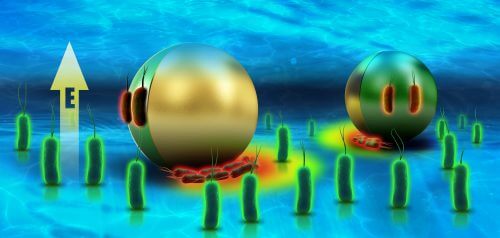A research group from the Technion has developed a unique method for using micro-swimmers (or micro-machines) as a means of selectively capturing individual cells, introducing molecules into them efficiently and precisely and transporting them to the desired location for further analysis. This platform will be used for disease diagnosis, cellular therapy and targeted drug delivery and will be an experimental tool for research in molecular biology

A research group from the Technion has developed an innovative method for using microswimmers as a means of selectively capturing individual cells, introducing molecules into them efficiently and accurately and transporting them to the desired location for further analysis. This platform will be used for disease diagnosis, cellular therapy and targeted drug delivery and will be an experimental tool for research in molecular biology.
Micro-swimmers, sometimes also called "active particles" or "micro-machines", are tiny particles with the ability to self-promote. In recent years, these particles have been discovered as promising microscopic and nanoscopic tools for single cell analysis, drug delivery, detoxification, environmental treatment, self-healing and more. The self-motion (autonomous) of the active particles is based on their ability to harvest energy and use it asymmetrically, which leads to the activation of local forces that move them.
The research was led by Prof. Gilad Yousiphon from the Faculty of Mechanical Engineering with the post-doctoral students Dr. Yue Wu from the Faculty of Mechanical Engineering and Dr. Apo Fu from the Faculty of Medicine at Rapaport. The study was published in the prestigious journal Science Advances.
A generic approach that can be applied not only to bacteria but to a wide variety of cell types
According to Professor Yousiphon, "In the current study we were able to show for the first time that using a single external electric field we are able to perform a variety of operations that include the capture and transport of bacteria as well as their selective electroporation. This is a generic approach that can be applied not only to bacteria but to a wide variety of cell types and microswimmers." Electroporation is a method in which an electric field is applied to the cell to increase the permeability of the membrane and thus introduce molecules, drugs, DNA and other substances into the cell. Among other things, the method is used to introduce DNA into bacteria to force them to replicate the same DNA.
The existing electroporation methods allow it to be performed only on a large group of cells at the same time, and not on a specific single cell. Prof. Yosiphon's breakthrough enables electroporation and introduction of molecules at the single cell level that can be selected in a targeted manner. And yet, the new method also makes it possible to perform electroporation in many cells at the same time, through the autonomous propulsion of the microswimmers. The effectiveness of the new process is partly due to local electroporation that is applied to part of the cell and increases its chances of survival and thus the success rate of the process. In fact, it is a kind of "laboratory-on-a-particle", based on micro-swimmers. Besides the existing advantages of "laboratories on a chip" - mobility, efficiency and more - the new platform - overcomes challenges such as complexity and early planning, since it is no longer necessary to produce a chip with a system of microchannels and electrodes with a fixed geometry planned in advance. In addition, unlike other techniques currently being developed for the benefit of electroporation on a single cell, the new technology does not require access to the cell from the outside, such as external micromanipulators, since it allows the cell to be influenced by an active particle even in closed spaces to which there is no access from the outside.
The approach was successfully demonstrated on bacteria and on Janus particles - artificial active particles with a non-uniform metallic coating for the purpose of breaking the symmetry. These particles actually constitute a floating electrode controlled by the operator. This method is applicable in a wide variety of cells and micromachines, and Prof. Yosiphon's research group is working on expanding it to human cells as well as to different types of cargo and different micromachines.
The research was supported by the Israel Science Foundation (ISF) and an honors scholarship from GTIIT (Guangdong-Technion-Israel Institute of Technology) to postdoctoral student Dr. Yue Wu.
